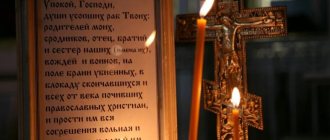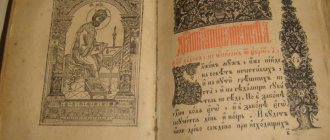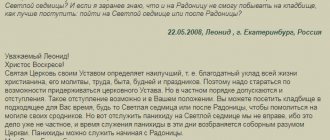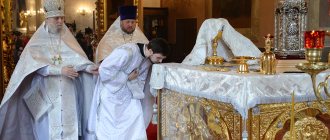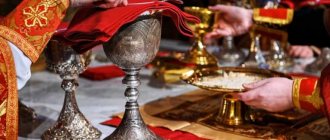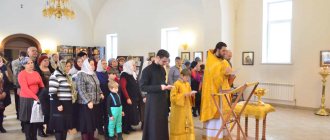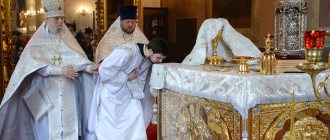Psalms and its meaning
The Book of Psalms belongs to prayer poetry and includes 150 psalms. The Psalms describe various events of the Old Testament, and its authors were King David, Abraham, Moses, Melchizedek and others.
The Psalms can be read both at services and at home. They are also read at funeral services, liturgies, and various services.
Important!
The Holy Resurrection of Christ in 2022 will be on April 19, and St. Thomas Week will be on April 26.
As Gregory of Nyssa says, the psalms are a “guiding hand” for a person who is at a loss, giving peace to the sick. Men and women learn wisdom from them, and for children, reading psalms is fun and joy.
Athanasius the Great claims that reading the psalms leads to repentance, gratitude to God, will relieve sorrow and temptation, and will prompt the answer to any life question.
Constantly reading psalms makes a person spiritually closer to God, he can cope with any troubles that arise in his life.
What is the Psalter?
This is a sacred book that contains divine messages - psalms. According to historical data, the Psalter was compiled by King David, to whom the Holy Spirit came and commanded it to be done.
Find out what awaits you today - Horoscope for today for all zodiac signs
The Psalter plays an important role in the church world. This book is considered to be one of the most important after the Bible. The psalms glorify the name of God and his apostles. It is believed that reading the Psalter helps to exorcise evil spirits, resist devilish temptations, and protect oneself, loved ones and home.
Currently, prayers from the Psalter are almost the basis of Christian worship.
Days when the Psalter is not read
There are days in the Orthodox calendar when the psalter is not read. In churches and at home, starting from Maundy Thursday and until St. Thomas Week, one should not read the psalms. This period lasts 10 days.
At home, kathisma should be divided into three Glories.
Important!
Kathisma is a special section in the Psalter in which you can sit. There are 20 kathismas.
Before reading the kathisma, you need to read “Our Father...”, after “Lord have mercy” 12 times, and then kneel with prayer.
How to read the Psalter for a beginner?
If you have never sung psalms, you need to know about some of the rules of these ancient and powerful prayers that exist today. Previously, it was customary to read the Psalter from memory, but, of course, you do not need to learn the prayers by heart; it is enough to have a church collection in front of your eyes or print them out.
Due to numerous requests from readers, we have prepared an “Orthodox Calendar” application for smartphones. Every morning you will receive information about the current day: holidays, fasts, days of remembrance, prayers, parables. Download for free: Orthodox Calendar 2022 (available on Android)
You can gather a group of believers and divide the psalms among yourself so that each of you reads a certain section of the texts. At the same time, it is necessary to agree that everyone in kathismas mentions not only his own name, but also the names of all members of his group.
What needs to be done to ensure that the reading of the Psalter follows church canons:
- It is very important to light a wax candle or lamp while reading prayers. The exception is when you are on the road and there is no opportunity to light a fire nearby.
- Kathismas from the Psalter are pronounced only aloud. You can do it in an undertone, but quite clearly and articulately. Then not only your brain, but also your soul will heed the words from the sacred texts.
- It is very important to monitor the correct pronunciation of accents. If you make a mistake, you can radically change the meaning of the prayer, which is not good.
- Unlike many other prayers, these can be read not while standing, but while sitting. It is not surprising - reading the psalter is a very long and tedious task, and it is almost impossible for an ordinary unprepared person to withstand such an amount of time.
- But while saying the opening and closing prayers, you need to stand up. The same rule applies to Slava.
- It is very important to pronounce the text monotonously, without any expression or theatricality. Singing a little, but without unnecessary expression of emotions. It is believed that if a person reads prayers emotionally and with expression, he succumbs to devilish temptations and is unable to resist passions.
Sometimes the meaning of spoken sentences may be completely unclear to you. It’s not scary, you shouldn’t worry about it and don’t stop reading. The main thing is that everything is clear to your soul. Over time, you will begin to feel the meaning of prayers intuitively, and you will not need explanations.
Holy Week
Holy Week is the six days of the week before Easter. Starting from Monday and ending on Saturday. The most unfavorable day for all work is Good Friday. On this day, Jesus was taken down from the cross and his body was buried.
During Great Lent, the Psalter is read twice in monasteries, and once in churches - in the morning and in the evening.
The morning service in the temple begins on Saturday and includes the singing of Psalm 17, and the evening service - 1. On Sunday only in the morning are Psalms 2, 3 sung. On Monday morning, Psalms 4, 5, 6, 7, 8 are read, and in the evening 18. On Tuesday, at the morning service, Psalms 9, 10, 11 are read, in the afternoon 12, 13, and in the evening 18. The last day, Wednesday - Psalms 14 - 16 are read in the morning, 19, 20 in the afternoon, 18 at the evening service.
Rules and features
As I already said, the Psalter stands apart from any other books of Holy Scripture. This is the only creation that is entirely included in the church statutes of Christian churches.
It is believed that in the kathismas of the Psalter all human life is sanctified, that this is an example of resistance to temptation and a great connection with God. This is why Christians value and respect this holy book so much.
Regarding church rules:
- In some cases, reading the Psalter requires permission from a priest. It is required if a believer wishes to take any vow or impose an additional prayer rule on himself. Otherwise, the priest’s blessing is not needed.
- It is forbidden to use psalms in prayers during the period from Maundy Thursday to Anti-Easter. This period is ten days.
- There is no need to recite the names of the psalms. Only the text should be read.
- You should pray every day, without missing a single one. Only then will the Psalter have enormous power and be able to truly influence your life, bring peace and tranquility into it.
- There are opinions that when reading the Psalter at home it is not necessary to adhere to a strict schedule. Much more important is a sincere attitude and understanding of why you need this prayer. The priests believe that a person should not depend on the volume of prayer or set some kind of plan for himself. It is better to come to this out of necessity, when you feel that your soul needs communication with God and cleansing.
Therefore, there are no strict rules, only sincerity and the ability to hear the desires of your soul. When communicating with God, turn off rationalism, brain and logic, listen to your heart and intuition. I believe that the words you speak are not as important as your sincerity and feelings.
Watch a video on the topic:
Week after Easter
The week after Easter is one of the joyful weeks of the year (along with Christmas). After all, Jesus Christ was resurrected, he conquered death.
Important!
During Bright Week there is no need to read the prayer of Ephraim the Syrian.
During this period, joyful and pious services are performed in churches. And the Orthodox Christian asks the question: when do they begin to read the Psalter after Easter? You can start reading psalms on St. Thomas Week.
The name of the first week after Easter is named after the Apostle Thomas, who was popularly nicknamed “the unbeliever.” The story goes that the apostles were persecuted by the authorities after the death of Jesus, so they did not leave the house. Christ appeared to them in a new hypostasis, as the Risen One. All the disciples believed it. But Thomas was not among them.
Important!
On the days of Bright Week, kathismas are not read.
When the companions of the Christian faith found him and told him about the miraculous resurrection of Jesus, he did not believe it and wanted proof (to touch the wounds on the body of Christ with his hand). On the first resurrection after Easter, the Son of God appeared to the apostles, and when Thomas touched his wounds, when he heard the words that he himself uttered, he believed in the Power of Christ.
Apostle Thomas is a collective image of a person who needs not only blind faith, but also facts.
Thomas Resurrection is also called Antipascha. Don't be afraid of this word. The prefix "anti" does not mean "against", but "instead of". The essence of this day is to repeat to everyone that Christ is Risen! This true idea was celebrated for seven days. After the festive service, the Royal Doors are closed, and the priests begin to read psalms, kathisma and polyeleos.
Therefore, the information about whether it is possible to read the Psalter on Bright Week is correct and unambiguous. The Church allows this.
Is it possible to read for repose on Holy Week?
Throughout Bright Week, the deceased are not publicly remembered. Believers submit a note to the Proskomedia. This is part of the liturgy that is celebrated every day of Easter week. The sacrament symbolizes the birth of Christ. During it, wine and bread are prepared, five church prosphoras and prosphoras served by believers are consumed:
- from the first, the central part is cut out - the Lamb;
- from the second a piece is taken out in honor of the Mother of God;
- the third prosphora is divided into nine parts in honor of the saints;
- pieces of the fourth bread are taken out for living priests, bishops, patriarchs;
- particles of the fifth liturgical prosphora are taken in honor of deceased priests, bishops, patriarchs;
- they take out notes from the prosphoras brought by believers;
- with the words “Lord remember,” they pronounce the names written on pieces of paper.
All the removed particles are placed in a special order on a dish - paten. It symbolizes the manger - the birthplace of Christ. In this invisible way the departed are remembered during the days of Easter week.
Comment! The church can accept a customized note of repose. In this case, in addition to removing the particle from the prosphora, the deacon reads the name of the person commemorated publicly at the litany, then the priest repeats it before the altar.
During Easter week and Easter, it is not recommended to visit the cemetery. Parents' Day in 2022 falls on April 28 - eight days after Easter, the first Tuesday after St. Thomas Sunday, the first day after Holy Week and Bright Week, when you can remember the dead.
The moving church holiday is called Radunitsa. People visit the graves of loved ones and invite priests to serve the litiya. Believers offer prayers for all Orthodox Christians. Many lay people do not understand that remembering means praying, not drinking.
On Parents' Day, in memory of the deceased, they prepare kutya and bake pancakes. Family friends, relatives, and good acquaintances are treated to simple food. While treating them, they ask you to pray for relatives who have left this world. On Radunitsa, believers go to church at the beginning of the service and submit a note with the names of the deceased for commemoration.
Psalter for Lent
Yes, the Psalter is read especially intensively in churches during Holy Week, but does this mean that Lent is the best time for singing psalms? I don’t think so, because this is more of a tribute to tradition, and you can start reading the Psalter when your heart asks. It’s just that during fasting this is done more often and intensely (twice).
What else can you do:
- Order services in the church for the repose of the deceased or for the health of living relatives, so that their names are mentioned during the reading of the Psalter.
- According to other opinions, it is better to pray on your own, putting part of your own soul into it, and not transferring responsibility into the hands of priests.
- By helping the souls of loved ones receive God's blessing, you cleanse your own soul, so independent prayer has a double effect.
It's amazing how sincere prayers work. I have heard stories more than once and seen with my own eyes people recovering from serious illnesses. Stories about how problems with work and personal life were resolved, peace and harmony came to the family. Thanks to sincere prayers, you change your inner state, and in response, the world around you and people “catch up.”
The Undying Psalter
Part of the answer to the question “what is the Indestructible Psalter” is helped by the very name of this special type of prayer. The word “unceasing” means unceasing. That is, the psalms are read around the clock, without breaks, day and night. Only monks perform this prayer.
All monasteries, despite different Charters and rules, are united by the Inexhaustible Psalter. As St. Augustine said: “The love of psalmody gave birth to monasteries.”
The tradition of continuous reading of the Psalter dates back about 15 centuries. Its founder was the Monk Alexander, who lived at the turn of the 4th-5th centuries. Having founded a monastery on the banks of the Euphrates River, the ascetic pondered for a long time whether a person could remain in constant praise of God. And if this is beyond the power of one person, then it can be accomplished by the entire brethren of the monastery. Each monk will take turns singing psalms, replacing each other. The Monk Alexander spent a long time in fasting and prayer turning to the Lord for a blessing for such a feat. And I received the answer: “Begin what you want - it pleases Me.” Thus, this monastery became the first to perform the rite of incessant psalmody.
In Rus' in the 11th century, the venerable Theodosius of Pechersk became the founder of the reading of the Undying Psalter. As rector of the Kiev Pechersk Lavra, he adopted the first Charter of the monastery. Its basis was the Charter of the famous Studite monastery in Constantinople. And for about 1000 years now, this special monastic prayer has been performed on Russian lands.
“Where the Indefatigable Psalter is read, it is like a pillar of fire reaching to the sky” (Elder Jerome of Sanaksar).
Why read the psalms
First of all, it should be noted that reading holy texts does not require the special blessing of a clergyman. The name of these texts comes from the Greek name for the musical instrument psaltery. The ancient Jews played it while singing psalms. Since then, the collection of songs in honor of the Almighty began to be called the Psalter.
The book contains an abbreviated expression of the entire holy scripture. It is presented in the form of prayer songs. According to the clergy, the holy book combines history, moral teachings and teachings that save a person from sin. There is also an opinion that the book contains all the main points from other holy scriptures. It expresses in detail the whole life of a simple person and parting instructions on how a righteous Christian should live.
In Orthodoxy, it is customary to read psalms daily under various circumstances. They are recited in the temple at least once a week. It is important to know that certain rules for reading them are described in the special book “Typicon”.
The best article for you, go to: Psalm 26 and 90 for protection from enemies
If you recite the texts of the holy book at home, then such reading will be called cell reading . How to read the psalms correctly? — this question is asked by a large number of Orthodox believers. Despite the fact that before starting to pronounce the texts you do not need to receive a blessing, it is still recommended to undergo the sacrament of confession.
How to read the Indestructible Psalter
As a rule, the feat of reading the Undying Psalter is carried out by the entire brethren of the monastery. The abbot of the monastery draws up a schedule in advance, in which everyone has their own reading order both day and night. This order is necessary so that the Holy Psalter is never closed. The reading takes place in the temple or in a nearby cell specially designated for this purpose.
“I ask and pray you, beloved, do not leave your hour of reading the Incessant Psalter and pray more diligently for each other, for relatives, for everyone you know and for the whole world, for all the departed who thirst for our prayers, for this is a great help for their souls.” (schema abbot Savva (Ostapenko).
Reading Holy Texts at Home
The private reading of the psalms is already a good tradition for believers. As a rule, they are pronounced by the family circle. Relatives and friends gather at a certain time and begin general reading. At first there was no special charter for such reading. But over time, some recommendations emerged:
- Before starting the reading, undergo the sacrament of confession and communion.
- The texts are read only in front of a lit lamp or church candle. A candle is not lit only if a person is in transport or traveling.
- Say the texts in a half-voice. This will help make it easier to understand the speaker.
- Put the correct stress on words. Since incorrect pronunciation of words is considered a great sin, because the essence of the words changes.
- There is no need to pronounce texts with theatrical passion; it is better to read them monotonously.
- The names of the psalms are not read.
The best article for you, go to: “And if I walk through the valley of the shadow of death” Psalm 23 of David
Sometimes there are situations when, at the beginning of the reading of a holy hymn, the believer does not understand its essence. Don't get upset right away. The main thing is to read it according to all the recommendations, and then gradually the whole essence and beauty of the texts will surely be revealed. It is imperative to adhere to the following recommendations:
- Before you begin to read the prayer chants, you must read the introductory petitions. They can be found in the holy collection.
- The entire text is divided into two parts (kathisma).
- It is important when pronouncing texts to mention both the living and the deceased.
- After reading the psalm, you must say an akathist.
- The whole process needs to be completed with special prayer chants.
Not all believers know how many times to read the psalms. In fact, you need to read them throughout your life. After the believer finishes reading the Testament, there is no need to take a break, you can start reading again.
Psalms are not a magic spell
An Orthodox Christian resorts to the life-giving power of the Psalter in a variety of everyday needs. But it is important to understand that they themselves are not some kind of magic formula. Simply reading the text of the psalm in anticipation of the fulfillment of one’s desire looks more like some kind of witchcraft conspiracy. This is completely unacceptable for an Orthodox Christian.
According to Saint John Chrysostom:
“...Psalmody is always a triumph for those who rejoice, a consolation for those who are despondent, and some kind of holy spell; it is not like those spells that are presented in fables, but it tames passions like wild animals, curbs intemperance, extinguishes injustice, supports the truth, overthrows blasphemous plans, kills shameful thoughts, proclaims the Divine law, preaches God, explains the faith, stops the mouth heretics, builds the Church.”
When praying the psalms, you need to have sincere faith and heartfelt trust in God. Glorify the name of the Lord and entrust yourself to His will.
